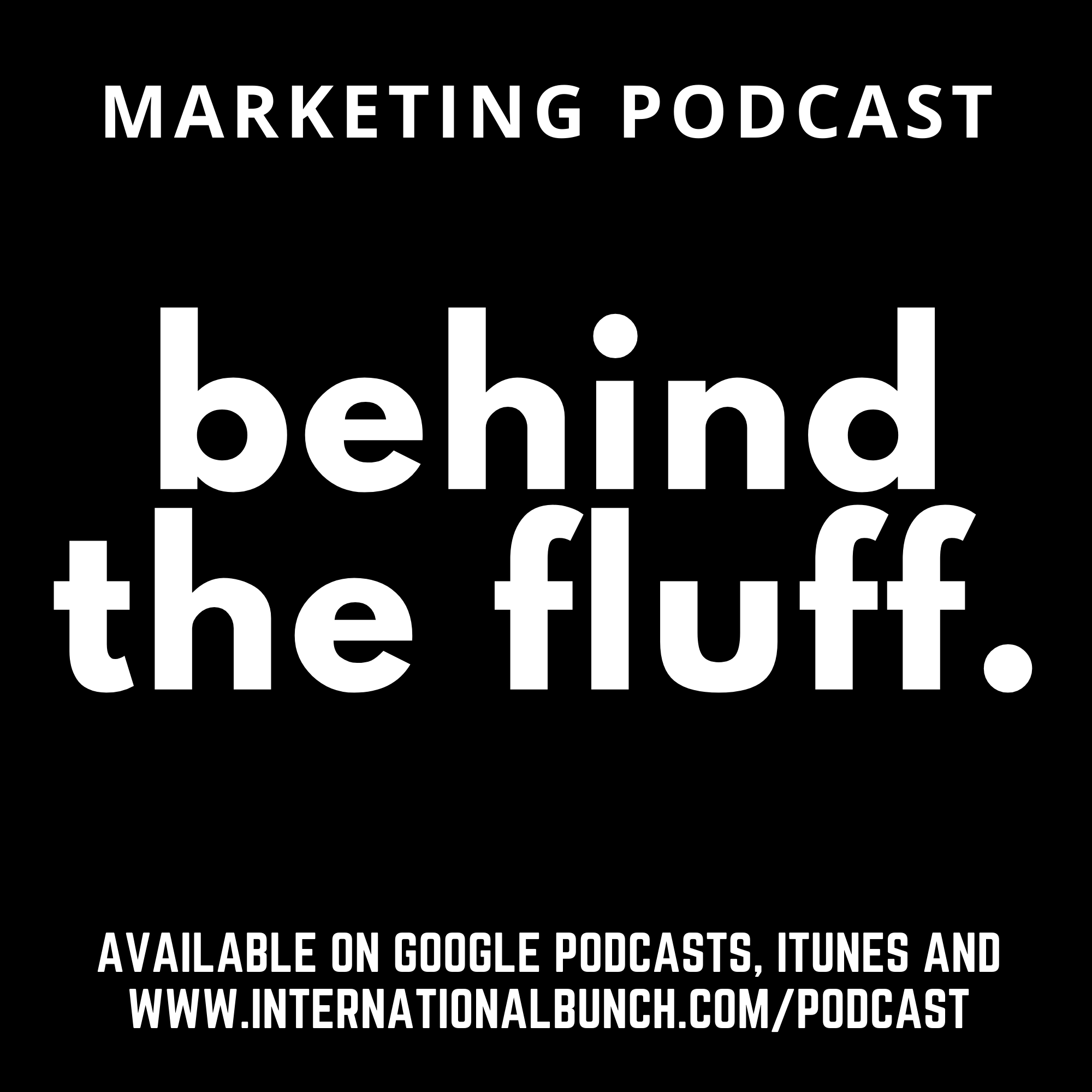
3.1K
Downloads
156
Episodes
How often have you heard marketing referred to as fluffy? If only they knew what was really behind the fluff! We're here to keep marketing connected and power progression. Join us for hot topical discussions in the scholarly and academic communications community. You'll also find it home of our #Donein60Seconds podcast series. Have an idea for what we should cover - get in touch! team@internationalbunch.com
How often have you heard marketing referred to as fluffy? If only they knew what was really behind the fluff! We're here to keep marketing connected and power progression. Join us for hot topical discussions in the scholarly and academic communications community. You'll also find it home of our #Donein60Seconds podcast series. Have an idea for what we should cover - get in touch! team@internationalbunch.com
Episodes

Tuesday Jan 26, 2021
Tuesday Jan 26, 2021
Lou discusses the top tips and best times for posting across Facebook, Twitter, Instagram and Linked.
Discover the accompanying blog post with all the information, images and links mentioned in the podcast: https://www.internationalbunch.com/post/raise-your-game-with-social-media
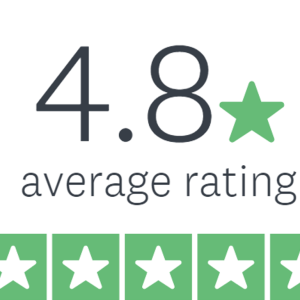
Friday Jan 15, 2021
Learn How To Develop An Effective Social Media Strategy
Friday Jan 15, 2021
Friday Jan 15, 2021
Explore the full transcript and links: Learn How To Develop An Effective Social Media Strategy (internationalbunch.com)

Wednesday Jan 13, 2021
Looking back on 2020 in marketing - and forward to 2021
Wednesday Jan 13, 2021
Wednesday Jan 13, 2021
Join Lou as she looks back over the key trends in 2020 - full script is available here - https://www.internationalbunch.com/post/looking-back-on-2020-in-marketing-and-forward-to-2021

Monday Jan 11, 2021
A new year, a new Chair role - ALPSP Membership and Marketing Committee
Monday Jan 11, 2021
Monday Jan 11, 2021
Join Lou as she talks about her new Chair role with the ALPSP Membership and Marketing Committee - discover the full script here - https://www.internationalbunch.com/post/a-new-year-a-new-chair-role-alpsp-membership-and-marketing-committee

Wednesday Dec 16, 2020
Why I have become Chair of CILIP Cymru Wales Committee
Wednesday Dec 16, 2020
Wednesday Dec 16, 2020
Join Lou as she talks through why she has become Chair of CILIP Cymru Wales Committee, the script and all links are available in the blog - https://www.internationalbunch.com/post/chair-of-cilip-cymru-wales-committee
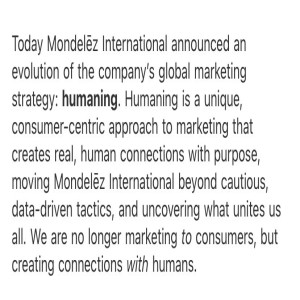
Thursday Nov 19, 2020
Is humaning just a failed buzzword - or does it actually have longevity?
Thursday Nov 19, 2020
Thursday Nov 19, 2020
If you're paying attention to what's going on in marketing over the past week, you may well have heard of 'humaning'. Firstly, let me explain what this is.
Mondelēz International, the global snack food company with brands like Cadbury, Oreo and Philadelphia, have crafted a new concept aligned to their diversity and inclusion strategy called 'humaning'.
Here's the definition in their words:
"Humaning is a unique, consumer-centric approach to marketing that creates real, human connections with purpose, moving Mondelēz International beyond cautious, data-driven tactics, and uncovering what unites us all. We are no longer marketing to consumers, but creating connections with humans."
Now that to me is a mouthful and could do with an extra full stop/period to make more of an impact.
You can read more on their website, however, the content has since disappeared due to the uproar it has caused. But those in the know can go to Wayback Archive - The Internet Archive and see the page that was archived. (Just to note, this is a free service like Wikipedia that is always looking for funding.) Here is the page for your reference: https://web.archive.org/web/20201112102335/https://www.mondelezinternational.com/News/New-Approach-to-Marketing-Humaning
Why has it caused such an uproar?
Since its launch, this new marketing strategy 'humaning' has been heavily criticized. While their intentions clearly came from a good place, it has gone down like a lead balloon facing criticism from the media, PR and marketing professionals and many on social media. I feel sorry for the people that bought into this new concept - we're all human and we've all had moments where we have a failed campaign or sent something out with an error etc. So, should we cut them some slack, or is 'humaning' just another failed buzzword fuelling the 'marketing is fluff' fire?
Mondelēz International chief marketing officer Martin Renaud has defended this new strategy. Ultimately he said that he expected some criticism but hoped people would look at what has been achieved so far and where can they accelerate the journey. He welcomes the criticism as a form of feedback, though they will continue to adopt this strategy and hope people will start to concentrate on 'why' they created the word - not what the word is.
He goes on to say: "Humaning is when storytelling becomes storydoing." Now, I have a problem with this. Why take such a great concept like storytelling and try to spin into something new called 'storydoing'? I get what they are trying to achieve, with one being telling the story to someone and the other being those individuals actually taking action. But if they really understood storytelling, they'd know it was more than about action - it's about that feeling you get inside, the connection you feel, what resonates and what you do because of that. If anything, storydoing is just a part of storytelling. It's like saying when marketing becomes events. Events sits under the umbrella of marketing: events is part of the ideology of marketing.
When I first saw 'humaning' last week, it didn't resonate with me. I understood what it was trying to achieve in the grand scheme of things, but it just doesn't work for me and it left me feeling confused. I applaud them moving from a financially driven mindset to a consumer-centric one with human connection at their core. I like that their marketing team has four key areas of focus now: leading with purpose; making each product "right"; mastering creativity, and being digital-first. But humaning and storydoing.... no, not for me. Only yesterday someone mentioned to me that idea of marketing being fluffy - clearly as marketers, we know it's not, but how can we move away from that when we're creating buzzwords like this?
If you are interested in reading more, here are some additional sources:
Let us know what you think...Facebook Twitter LinkedIn with #humaning
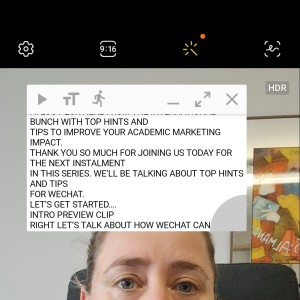
Friday Nov 13, 2020
Top 5 tips to remove barriers for authentic video, and kit recommendations
Friday Nov 13, 2020
Friday Nov 13, 2020
Join Lou as she discusses our top 5 tips to remove barriers for authentic video, and kit recommendations - all links and script can be found here - https://www.internationalbunch.com/post/5_top_tips_authentic_video

Tuesday Nov 10, 2020
4 marketing basics to consider when successfully launching a new journal
Tuesday Nov 10, 2020
Tuesday Nov 10, 2020
-
improve the journal's impact in your subject niche
-
disseminate key messages with your audience aligned to your strategy
-
improve the visibility of your journal and it’s articles
-
encourage conversations around your journal/articles/topics
-
Launch xx [journal] on 1st March 2021 to the global chemistry research community - the journal needs to launch by a certain date to meet the objective and to a specific community - that is how it is measured as a success
-
Reach an audience of over one million across social media through the 2021 launch campaign on Facebook, Twitter and LinkedIn - here we have given the specific campaign, social channels and our key performance indicator (KPI) one million
-
Launch [journal] email sent out 1st March 2021 to existing institution relevant contacts to have a unique click to open rate above industry average at 15% and a call to action to submit - this is specific to an email campaign and rather than focusing on click-through rate, this focuses on those that are engaged and opened the email that have then actually then gone on to click through
-
XX submissions to [the journal] in March 2021 - we are giving a KPI here and by the launch month of the journal
-
Increase submissions from the US by 10% in 2021 - this one relates to regional growth and will have specific objectives about how to achieve - this could be a high-level objective that filters down through marketing, sales and editorial to have their own department-level objectives to support the journal
-
Publish 20% more articles in [journal] in 2021 than 2020 - this is using a previous year as a benchmark and using growth as a key strategy
-
Identify what the journal’s scope is and which niche it will resonate most with
-
What is the most important pain point or challenge your journal is addressing?
-
Think about all the stakeholders - not just the researchers, authors and readers - but the advocates - librarians, funders, internal staff and colleagues, and finally the public who are more engaged in research than ever before
-
Align your key messaging with your defined strategy to ensure you achieve what you set out to do, and don't get sidetracked - keep focused
-
Tell the story of your journal - engage, inspire and motivate your community to get involved
-
Communicate to a global audience - think about simple clear communications
-
Help your journal stand out from the crowd and be UNforgettable
-
Identify the best tools/platforms to effectively reach your target audience
-
Discoverability – being search friendly is important in today’s digital world so make sure the journal homepage and articles contain up-to-date information and is search engine optimized. For example, Wiley states that more than 50% of traffic to Wiley’s Online Library comes from online searches so getting this right can make a massive difference to your impact. Also, think about where is your journal content indexed and which directories is your journal on - how accessible is your content? Is your content aggregated?
-
Printed collateral – traditional marketing tactics like printed promotional materials such as posters, business cards and flyers can be key to raising the visibility of your journal at events and conferences, but they can be hard to measure the effectiveness of. Many publishers are now looking to reduce their costs and environmental impact by hugely cutting back what they print
-
Online media – digital marketing is becoming increasingly important and can result in better response times, improved customer interaction and provide clearly measurable results. Having journal-specific social media accounts can be an effective way of disseminating key messages and published content - or having subject level social accounts so you can share the responsibility of populating social channels with colleagues. Don’t forget to include links to the journal homepage or individual articles within your posts to make it easy for your audience to access. Once you decide on a social media channel, you need to be committed to it and have a strategy in place. Social advertising gives you greater flexibility and more targetted approaches and may be worth considering. We've got a series of hints and tips for YouTube, Instagram, Twitter, Facebook, LinkedIn, Reddit and WeChat for you to check out - https://www.youtube.com/playlist?list=PLzZ3BrpL2eGso7yhy-x-Aiq6Th6mQ5Vny
-
Promotions – dependent on your strategy, you could be looking to have exciting and sought after promotional items at events, encourage opt-ins to TOC alerts and journal newsletters through competitions, and have giveaways - just be mindful of the legalities around
-
Email campaign – sending out a series of emails to your existing audience is an easy way to spread the message of your new journal amongst your list of already relevant and engaged contacts. Do not send out an email to everyone in your list - you'll end up spamming people not interested, increase the likelihood of opt-outs and have poor engagement metrics. Carefully consider who really wants to know, and how engaged have they been in emails over the last year as a couple of examples
-
Digital banners – whether you have budget available for digital advertising like MPU banners or are just creating social banners, these can be an effective way to target your audience. The content of the banner needs to clearly inform the end-user and contain a specific call-to-action, e.g. submit to the journal. It’s important to select a site that is both relevant to your subject and is a place your target audience visit regularly. Of course, banners don't have to be just for websites and social channels but can be used as email signatures too. Animate your banners, include videos and GIFs rather than just static text for better engagement. We found this handy Google doc listing up-to-date social media image specifications for a number of social channels - https://www.internationalbunch.com/social-media-specifications
-
Email signatures – including links to your social media profiles and journal homepage on your email signature is an easy win to help widen your reach, as well as create an email signature banner - though be aware that images in emails like in signatures can cause your email to be flagged to sensitive spam filters
-
Press release – create a press release to alert the media of the launch. Make sure the story will be of interest to the wider public. Check out Class PR for guidance on how to write a press release

Wednesday Oct 14, 2020
What does Pay Per Click (PPC) mean?
Wednesday Oct 14, 2020
Wednesday Oct 14, 2020
Hi, this is Lou Peck from The International Bunch, and I'm going to talk to you about Pay Per Click in under 60 seconds.
Pay Per Click (also known as PPC) is an online advertising model where the advertiser pays each time their advert is clicked. Search engine advertising is one of the most popular types of PPC. Keywords form the foundation of a PPC campaign.
Advertisers bid to place their ad in a search engine’s sponsored links section when someone searches a related keyword with real-time bidding. Ultimately the person clicks on the link to complete the call to action.
There are several tools available to help research and select the right keywords. Ensure that PPC campaigns are carefully targeted and relevant (e.g. be niche). Search engines reward efficient campaigns by charging less per click.
Successful PPC campaigns share – campaigns, ad groups, keywords, ad text and landing pages
Discover more helpful resources at www.internationalbunch.com/resources

Monday Oct 12, 2020
Getting started on social media - 9 top tips
Monday Oct 12, 2020
Monday Oct 12, 2020
Social media is a powerful platform that can help you build brand awareness and generate leads. It’s also one of the most effective tools to help you maintain and build relationships with your customers.
Nowadays, consumers live on social media. In fact in the UK in 2019, it was reported that people spend nearly 2 full hours every day on social platforms (1 hour 50 to be precise). Over the past decade, social media has quickly become one of the most important aspects of digital marketing.
However, the world of social media can be daunting.
Many small businesses shy away from social media because they don’t know where to start or think there’s a high cost involved. Luckily for, us it’s completely free! This means you aren’t limited and have the same opportunity as every other brand, including your competition.
So what is the key to success on social? It’s all about creating, executing and monitoring your social media marketing strategy. This may not mean much to you now, but continue reading and you’ll set yourself up for success.
Below are our top tips to help you create a strategy and succeed:
1. Define your goals – first of all it’s important to identify what you want social media to help your business achieve. Examples of goals are to increase awareness amongst your audience or generate new business sales/enquiries. Also think about how you can measure these to make sure what you're doing works and you're not wasting your time.
2. Identify your target audience – identifying your customers and understanding who they are is an essential aspect of marketing. Think about their interests, their online activity (when they go online and why) and how they use social media. It’s important to always have this information in mind, particularly when planning your content. Most importantly you need to identify your niche and resonate with them - by concentrating on your niche you can focus on those that are most important to what you are offering and have better engagement.
3. Decide which platforms are right for you – recent statistics show that there are over 75 live social media platforms. It’s not an effective use of your time or money to manage an account on every network. Instead, you should consider the platforms which allow you to engage with your target audience the best. As a starting point, we recommend launching two or three platforms and once these are more established, then look at expanding onto other networks if it will help you achieve your goal(s).
4. Keep personal and business accounts separate – your family might enjoy receiving updates of your child/pet however clients probably don’t, and vice versa. Keep your accounts separate to avoid your customers becoming less engaged with you.
5. Choose suitable account names – when choosing your account names, consider how easy the handle (account name) is for your customers to find. Make sure the name is clearly associated with your brand and even consider the spelling. If your spelling is unusual will it restrict who can find your account?
6. Conduct competitor analysis – keeping an eye on what your competitors are doing on social media is a great way to identify what does and doesn’t go down well with your audience. It can also help you highlight any gaps in your own strategy or give you inspiration.
7. Find inspiration from other accounts that you admire – this is a great way to find inspiration and use as a benchmark. Look at what accounts you engage with regularly personally and if you can, find out what accounts your audience admire.
8. Consistently share a range of content – whilst it might be important to share your products/services/brand, don’t make this all you post about. Share anything your audience will be interested in. In marketing it’s called the 80-20 rule – use 80% of your content to inform, educate or entertain your audience, and the other 20% to promote your product/service/brand. No one likes a robot, be human and post great content.
Check out our Storytelling Masterclass for inspiration.
9. And finally, be yourself – make sure your content shows off your personality, after all, you is what makes your brand/business unique!
If you follow all of our advice, it will take your social media strategy to the next level!
Develop your skills
If you want to learn more about social media marketing:
-
we have a range of hints and tips videos, recorded webinars and live webinars
-
check out Google's range of Digital Garage online courses - a set of excellent short videos that cover the basics of digital marketing and are completely free. Upon completion of the full set, you'll also receive a nice certificate!
-
alternatively, if you're short on time, check out this tutorial on YouTube - How to start social media marketing (4 essential tips for beginners).
Get in touch
Please get in touch if you would want to find out about our services and how we can help your organization grow.

Wednesday Oct 07, 2020
Incorporate Inclusion Into Your Communications Strategy
Wednesday Oct 07, 2020
Wednesday Oct 07, 2020
Authentic communication has the capacity to forge connections and build relationships. Inclusion and diversity are high on the agenda for many organizations but the language in communications can still fall short.
Ensuring your intended audience feels a sense of belonging helps improve retention and customer satisfaction.
-
Have you considered The Social Model of Disability when you are writing?
-
Are you writing person-first language?
-
Are you including scripts with videos and podcasts?
These are just some of the things you need to think about. We have a super helpful Masterclass on 'Incorporate Inclusion Into Your Communications Strategy' to discover more about how you can improve your communications.
We also have a web accessibility checklist to think about/use when looking at your content platform and how you can improve the accessibility of your content.
Here are some hints and tips when thinking about producing documents which weren't covered in the masterclass:
-
use meaningful heading, bullet points, structure – using styles for bullets and tables helps a screen reader read content
-
use heading structured hierarchy ‘heading 1’, ‘heading 2’ etc instead of bolding headings
-
minimum of 12pt font size
-
sans serif font e.g. Arial or Helvetica
-
sentence case – avoid capital letters and italics
-
left aligned more favourable then justified
-
avoid underlining except for hyperlinks
-
single continuous columns easier to read than complex layouts
-
keep tables simple – avoid splitting or merging cells – use for data
-
avoid using colour as a sole meaning e.g. click on the green button – how would someone who is blind easily know which button is green
-
avoid footnotes and add explanations inline
Make sure you check out the range of our free marketing resources.

Monday Sep 21, 2020
The secrets of media training - 12 top tips
Monday Sep 21, 2020
Monday Sep 21, 2020
Are you worried about an upcoming interview and not sure how to prepare? Lucky for you, you’re in the right place. This blog contains our 12 top tips to help you nail your media interviews.
But first, what exactly is public relations and why is it important?
Public relations (PR) is about managing your organization's brand and communications, by using media channels (e.g. broadcast, print and online), relationships and activities. It is used to drive awareness, foster positive positioning, and counter negativity - especially in times of crisis. Introducing a PR strategy for you/your organization/brand can help you increase awareness, help manage your reputation and strengthen community relations.
Our top tips to help you succeed:
1. Decide the best format
Before even deciding who is right to represent your organization/brand, you need to be thinking about which format of the response is appropriate. Is it a live interview or a written statement? It needs to align with your existing communications strategy, and you may want to reduce any reputational damage surrounding the story.
If for example, you need to defend a negative story that attacks your brand/organization; you're dealing with a reputation issue where you are already depicted as the villain; or crisis communication, you may want to issue a written statement rather than an interview and avoid attention-grabbing headlines by saying something you later regret.
2. Match the spokesperson to the format
Dependent on the format of the interview, you need to select the best person for the job. Consider whether they are quick on their feet to answer a question in a live interview, or whether they are better suited to respond to media queries in writing. You'll need to prepare the spokesperson for different kinds of reporters.
3. Research your interviewer and the medium
Discover a bit more about the person who is interviewing you. Look at their previous interviews to get a sense about what questions they may ask you. You can do this simply by popping their name into an online search engine like Google or Bing. They may even send over their questions in advance if you ask. It's vital to understand the motivations of the interviewer, you may discover through the research that the interviewer likes to delve into private/personal issues and so you need to be prepared for how to answer these. Also do confirm their correspondence email address matches that of the media outlet they say they represent. Many media outlets do commission freelancer writers - you just need to be sure they are credible individuals.
Also, look at the credibility of their platform and better understand who their audience is to ensure the answers resonate, and for you to get a better sense of what they might ask you.
4. Be prepared and consistent
Think about what questions you will be asked and prepare rough answers/list out summary points to discuss, and have a clear focus about the story you intend to tell. We recommend making a list of anything you want to cover. Don’t write a full script, keep your answers natural and tailored to the question. By developing go-to phrases to ensure a consistent 'to brand' message.
You may also want to think about how you can illustrate any points you make with examples. Where possible, undertake media training or get a real-life interview under your belt as soon as possible.
5. Display control and clear communication
To ensure you resonate in a multi-global environment, talk slowly and clearly during the interview and pause to emphasise certain points. This can be really helpful for those with stronger regional accents. By simplifying your language you'll have a clear more impactful message.
When answering a question, incorporate the question within the start of your answer to help keep your answers succinct. Do get your message across early and give examples - you don't have to wait to be asked - just make sure it fits with your responses and doesn't sound out of place. It's your story so use 'bridging' to help you get where you need to be.
Regardless of how much preparation you do, there may be someone that throws you a curveball. Stay composed and don't rise to the bait in an interview to keep the audience with you. Stick to the facts and don't speculate - remember it becomes public record - but avoid saying no comment. Some example answers to pivot or rephrase where appropriate are:
- I don't know about that, but what I can tell you is...
- the real issue is...
- what really matters is…
- that’s an interesting point however I think the real issue here is...
- I'm focused on [2020 and the challenges facing us right now]
Listen closely to what is being said, acknowledge what is being asked and decide how you want to answer.
When interviewing on the phone, if you stand up and smile as you speak (looking into a mirror helps), you'll project better and appear to have more energy. For a print interview - that starts the moment you walk in a room or answer the call.
6. Know the facts
When speaking to an authoritative figure, the interviewer will expect you to have a grasp of the facts and figures related to what you are discussing. Anything that needs to be clarified should be sent soon after the interview to avoid delays in dissemination. Ensure they are correct when stating them as they may become public record.
They are also great for combating challenging questions.
7. Beware of fake news
As part of your research, you will have looked into the interviewer and their platform to check the authenticity to minimize being part of a fake news outlet/story. If you see any errors or misquotes from the interviewer - make sure you reach out to the reporter, cite any errors and ask for them to be corrected before print. If printed, they may need to send out an amendment. Where possible, ask to approve the final piece to ensure the accuracy of information.
8. Concentrate on the flow
Practice doing interviews with a friend or colleague, record yourself on a device like a mobile and replay to see how you come across. Try to breathe and be more relaxed and natural, rather than robotic. When you bring in personal experience, you demonstrate more empathy which resonates well which can also be done with storytelling. Think of it more like a performance and inject some enthusiasm into it (but not too much so you don't want to go over the top!).
Most people feel daunted and on-edge when being filmed – if this is you, it’s important you practice. Discover examples of good interviews on YouTube.
Don't talk over the interviewer - always make sure you listen to their question and then give your considered response. It can make you look defensive, rushed and unprofessional if you answer before they finish.
9. What is your body saying?
When being filmed, use eye contact where possible with the interviewer to reinforce confidence. By using facial expressions you can easily portray your emotions – if it’s a positive story, remember to smile! Do use your hands to help you express your message but don't over-using them, and try not to fidget.
Telling you to relax is easier said than done, but if you prepare well, it will help you make the most of the opportunity. Remember to breathe!
10. Thank the interviewer
Be sure to thank the interviewer for their time and the opportunity.
11. Be the one asked to be quoted
When you demonstrate your authentic expertise in a smart, accessible way and provide interesting quotes, you'll become more attractive to the media to reach out to for quotes.
12. Dealing with trolls
Sadly we live in a world that has created an environment for trolls and trolling. These are individuals (anonymous or fake accounts, or true individuals) who post abusive, harsh, irrelevant and hurtful comments. They are looking to create a stir, cause a reaction and provoke a response. Regardless of your story or what is being trolled, you need to be prepared for this and have a strategy in place to minimize the impact:
- check they are actually a troll before taking any immediate action
- establish a community policy if managing a page or group and remind people of the rules with a link. Most social platforms have their own
- ignore them, don't feed the fire - be mindful your followers and fans may not ignore them but they will be watching how you might respond
- don't be baited
- if you've made a mistake, correct it and own it
- respond to them with facts to disprove their argument and misinformation
- make light of the situation and diffuse with humour
- don't delete their posts as it can escalate their behaviour
- either you or someone should be in control of blocking or banning them
- if you have a blog, make sure you approve comments so you can disregard trolling comments
- by having a loyal community, you may find that the community does some of the work for you
- submit a report to the social platform if they are in violation of the language policies
Check out Hootsuite's social media etiquette.
It’s also important to look after your own mental health – try not to let any negativity get to you and remember the reason behind your story.
We hope you’ve found our tips useful. If you would like further advice or one-on-one media coaching, please get in touch with us. We’re happy to help.

Tuesday Sep 08, 2020
WeChat - Scholarly Communications and Academic Marketing Hints and Tips Series
Tuesday Sep 08, 2020
Tuesday Sep 08, 2020
We're delighted to bring you our seventh instalment of our series covering scholarly communications hints and tips. This podcast looks at how to communicate and engage with academics in China on WeChat.
Make sure you subscribe to this channel to receive updates of great content we post and let us know your thoughts, or what else you want us to cover in our videos. The next in this series will be about Reddit. These are useful for those in academic and scholarly marketing.
Discover our helpful resources:
• Blog - https://www.internationalbunch.com/blog
• Done in 60 Seconds Podcast - https://www.internationalbunch.com/donein60seconds
• Podcast - https://www.internationalbunch.com/podcast
• Marketing Resources - https://www.internationalbunch.com/marketing-resources
• Website - https://www.internationalbunch.com

Wednesday Aug 05, 2020
Boost your copywriting skills with these formulas
Wednesday Aug 05, 2020
Wednesday Aug 05, 2020
Taking your copywriting to the next level is simple – you just need to harness the right strategies. Learn more about the best copywriting practices.
Explore the full transcript and links: Boost your copywriting skills with these formulas (internationalbunch.com)

Tuesday Jul 28, 2020
LinkedIn - Scholarly Communications and Academic Marketing Hints and Tips
Tuesday Jul 28, 2020
Tuesday Jul 28, 2020
We're delighted to bring you our fifth instalment of our series covering scholarly communications hints and tips. This podcast looks at how to create organic reach on LinkedIn.
Make sure you subscribe to this channel to receive updates of great content we post and let us know your thoughts, or what else you want us to cover in our videos. The next in this series will be about Reddit. These are useful for those in academic and scholarly marketing.
Discover our helpful resources:
• Blog - https://www.internationalbunch.com/blog
• Done in 60 Seconds Podcast - https://www.internationalbunch.com/donein60seconds
• Podcast - https://www.internationalbunch.com/podcast
• Marketing Resources - https://www.internationalbunch.com/marketing-resources
• Website - https://www.internationalbunch.com
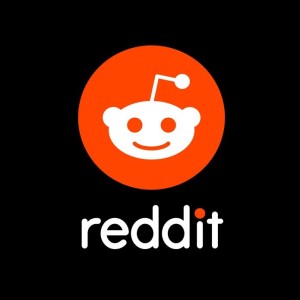
Monday Jul 13, 2020
Monday Jul 13, 2020
We're delighted to bring you our sixth instalment of our series covering scholarly communications and academic marketing hints and tips. This recording looks at how to build trust through authentic discussion. Make sure you subscribe to this channel to receive updates of great content we post and let us know your thoughts, or what else you want us to cover. The next in this series will be about WeChat. These podcasts are useful for those in academic and scholarly marketing.
Discover our helpful resources:
• Blog - https://www.internationalbunch.com/blog
• Done in 60 Seconds Podcast - https://www.internationalbunch.com/donein60seconds
• Podcast - https://www.internationalbunch.com/podcast
• Marketing Resources - https://www.internationalbunch.com/marketing-resources
• Website - https://www.internationalbunch.com

Tuesday May 12, 2020
What is return on investment (ROI)?
Tuesday May 12, 2020
Tuesday May 12, 2020
Hi, this is Lou Peck from The International Bunch, and I'm going to talk to you about Return on Investment or ROI in under 60 seconds.
ROI is the ratio between gain, so profit over a set time period or positive results like the number of sales leads from a conference, and the cost of investment like staff time and effort, event and paid social costs etc.
A high ROI is positive as it shows little effort with high impact or big costs with even bigger gain.
You want to deep dive into statistics to measure your campaigns and analyze their effectiveness ultimately resulting in what you should change, keep and stop doing. Establish benchmarks to measure ROI for more informed decisions. Think about it as what we do versus what we gain.
A simple example is:
(Sales Growth - Marketing Cost) / Marketing Cost x 100 = ROI %
Discover more helpful resources at internationalbunch.com/resources

Thursday Apr 30, 2020
Social Media trends 2020 – what to expect
Thursday Apr 30, 2020
Thursday Apr 30, 2020
What’s the betting that, despite the headway that you’d been making with your digital detox, your screentime has actually gone completely the other way during the COVID-19 lockdown?
Explore the full transcript and links: Social Media trends 2020 – what to expect (internationalbunch.com)

Tuesday Apr 14, 2020
Tuesday Apr 14, 2020
The International Bunch was commissioned to carry out in-depth market research looking at a range of publishing organizations from across the industry. We explored how marketing departments are structured and the challenges they face. In addition to focusing on structure and how that changes, we also looked at the current trends in scholarly marketing and explored some of the key themes which emerged from the research. We’d like to thank those involved in this research project for their support and we have summarized the findings.
Read the blog post - https://bit.ly/2R2rC8Y

Tuesday Mar 31, 2020
Facebook - Scholarly Communications and Academic Marketing Hints and Tips Series
Tuesday Mar 31, 2020
Tuesday Mar 31, 2020
We're delighted to bring you our fourth instalment in our series covering scholarly communications and academic marketing hints and tips.
This fourth podcast covers Facebook algorithms and top tips for posting engaging content. Ensure you subscribe to this channel to receive updates of great content we post and let us know your thoughts, or what else you want us to cover. Our content is useful for those in academic and scholarly marketing, and beyond.
Discover our helpful resources:
• Blog - https://www.internationalbunch.com/blog
• Done in 60 Seconds Podcast - https://www.internationalbunch.com/donein60seconds
• Podcast - https://www.internationalbunch.com/podcast
• Marketing Resources - https://www.internationalbunch.com/marketing-resources
• Website - https://www.internationalbunch.com

Tuesday Mar 17, 2020
Bring your own (BYOB) - putting the fun into virtual networking and conferences
Tuesday Mar 17, 2020
Tuesday Mar 17, 2020
These last few weeks and the impact of COVID-19 (Coronavirus) have seen scores of events cancelled including London Book Fair, Redux, and UKSG. In fact, the last conference I attended was Researcher to Reader and I haven't been to one since. Not only are we missing out on chatting and networking together at venues, but we're also missing out on the valuable content and discussions that we were seeking to learn more about. Now that many are having to work remotely, this presents opportunities to create exciting environments to engage and learn.
Explore the full transcript and links: Bring your own (BYOB) - putting the fun into virtual networking and conferences (internationalbunch.com)

Friday Mar 13, 2020
What is TikTok?
Friday Mar 13, 2020
Friday Mar 13, 2020
Hi, this is Lou Peck from The International Bunch, and I'm going to talk to you about TikTok in under 60 seconds.
Beijing-based company ByteDance created the video social network Douyin for the Chinese market in 2016. They then launched TikTok in 2017 for those outside of China.
Users create short lip-sync, comedy and talent videos of 3 to 15 seconds and short looping videos of 3 to 60 seconds. Made by young people for young people it is now seeing worldwide adoption across the age ranges.
TikTok is having phenomenal success, challenging YouTube in the video space. In 2019 it was declared the 7th most downloaded app of the decade.
There are four primary ad formats:
- in-feed vertical video
- branded filters
- full-screen takeovers
- and hashtag campaigns
If you're looking to engage with digital adopters and early career researchers, this is a great tool.
Discover more helpful resources at internationalbunch.com/resources
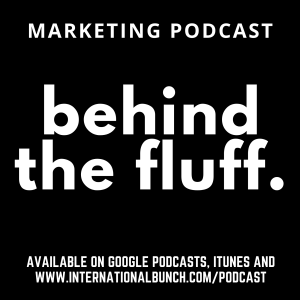
Tuesday Mar 10, 2020
Tuesday Mar 10, 2020
A recent paper published in February 2020 in ALPSP’s Learned Publishing has highlighted some of the significant changes in research output and quality in China. Back in December 2019, The International Bunch published a blog post reporting on the increase in R&D funding, and the focus on publication ethics and quality we saw in the China publishing industry.
Explore the full transcript and links: https://www.internationalbunch.com/post/china-increases-research-output-new-findings-and-a-response-to-coronavirus-covid-19

Thursday Feb 27, 2020
Twitter - Academic Marketing Hints and Tips
Thursday Feb 27, 2020
Thursday Feb 27, 2020
We're delighted to bring you our third instalment in the new series covering academic marketing hints and tips. This third podcast looks at key themes and optimizing your account for Twitter. Ensure you subscribe to this channel to receive updates of great content we post and let us know your thoughts, or what else you want us to cover in our videos. The next podcast in this series will be about LinkedIn. These videos are useful for those in academic and scholarly marketing. Discover our helpful resources:
- Blog - https://www.internationalbunch.com/blog
- Done in 60 Seconds Podcast - https://www.internationalbunch.com/donein60seconds
- Podcast - https://www.internationalbunch.com/podcast
- Marketing Resources - https://www.internationalbunch.com/marketing-resources
- Website - https://www.internationalbunch.com

Friday Feb 14, 2020
Academic Marketing Hints and Tips - Instagram
Friday Feb 14, 2020
Friday Feb 14, 2020
We're delighted to bring you our second instalment in the new series covering academic marketing hints and tips. This second instalment looks at optimizing your bio and activity.
Ensure you subscribe to this channel to receive updates of great content we post and let us know your thoughts, or what else you want us to cover in our videos and podcasts. The next in this series will be about Twitter. These videos are useful for those in academic and scholarly marketing. Discover our helpful resources:
- Blog - https://www.internationalbunch.com/blog
- Done in 60 Seconds Podcast - https://www.internationalbunch.com/donein60seconds
- Podcast - https://www.internationalbunch.com/podcast
- Marketing Resources - https://www.internationalbunch.com/marketing-resources
- Website - https://www.internationalbunch.com/

Friday Feb 14, 2020
Academic Marketing Hints and Tips - YouTube
Friday Feb 14, 2020
Friday Feb 14, 2020
We're delighted to bring you our new series covering academic marketing hints and tips. This first instalment looks at three key strategies and common mistakes to avoid with YouTube. Ensure you subscribe to this channel to receive updates of great content we post and let us know your thoughts, or what else you want us to cover in our videos and podcasts. The next in this series will be about Instagram. Useful for those in academic and scholarly marketing.
Discover our helpful resources:
- Blog - https://www.internationalbunch.com/blog
- Done in 60 Seconds Podcast - https://www.internationalbunch.com/donein60seconds
- Podcast - https://www.internationalbunch.com/podcast
- Marketing Resources - https://www.internationalbunch.com/marketing-resources
- Website - https://www.internationalbunch.com/

Friday Jan 03, 2020
What is DORA – The Declaration on Research Assessment?
Friday Jan 03, 2020
Friday Jan 03, 2020
Hi, this is Lou Peck from The International Bunch and I’m going to talk to you about DORA – The Declaration on Research Assessment in under 60 seconds.
DORA recognises the need to improve how we evaluate scholarly research outputs like removing such heavy reliance on impact factor as a key measure. It acknowledges that the evaluation of scholarly and research outputs should be based on the accomplishments of those individual outputs, rather than on journal-level metrics.
It was developed in 2012 during the Annual Meeting of the American Society for Cell Biology in San Francisco, then published on the 13th May 2013.
DORA has become a worldwide initiative covering all scholarly disciplines and all key stakeholders including publishers, funders, professional societies, researchers and institutions.
As of January 2020, 1,800 institutions have signed the declaration and 15,500 individuals.
Discover more helpful resources at internationalbunch.com/resources

Friday Jan 03, 2020
What are the common types of peer review?
Friday Jan 03, 2020
Friday Jan 03, 2020
Hi, this is Lou Peck from The International Bunch and I’m going to talk to you about the six most common types of peer review in under 60 seconds.
- Single-blind peer review – reviewers know who the authors are, but the authors do not know who the reviewers are
- Double-blind peer review – authors and reviewers remain anonymous to each other
- Open/transparent peer review – authors and reviewers are aware of who each other are
- Post-publication peer review – peer review happens after the work is published – e.g. preprints, papers on F1000
- Collaborative peer review – peer reviewers can view each other's interactions and produce a final report
- Interactive peer review – peer reviewers interact with authors providing real-time feedback and collaborate with fellow peer reviewers. Once the final version is agreed, it is published!
Discover more helpful resources at internationalbunch.com/resources

Thursday Dec 12, 2019
Addressing three major challenges for the Indian research community
Thursday Dec 12, 2019
Thursday Dec 12, 2019
The landscape of research and scholarly communications is continually changing. To balance the priorities of researchers, institutions, funders, publishers and intermediaries means that we have an ecosystem with significant challenges. In this post, we look at the research landscape in India and explore three challenges facing the scholarly community: research quality, open research, and predatory publishing.
Explore the full transcript and links: Addressing three major challenges for the Indian research community (internationalbunch.com)

Tuesday Dec 03, 2019
Tuesday Dec 03, 2019
On Giving Tuesday - December 3 - controversial ethicist and Princeton University professor Peter Singer releases, free in ebook and audiobook editions, an expanded and fully updated 10th Anniversary Edition of his influential book, The Life You Can Save, previously published by Random House.
Explore the full transcript and links: https://www.internationalbunch.com/post/peter-singer-free-ebook-and-audio-book-on-ending-global-poverty

Friday Oct 04, 2019
China’s increased investment in research brings opportunities and challenges
Friday Oct 04, 2019
Friday Oct 04, 2019
A steady increase in spending on research and development in China over the past decade is producing an active and rapidly growing research environment. We've pulled together some of the latest research and publications highlighting the real-world impact of China's increased investment in research.
Explore the full transcript and links: China’s increased investment in research brings opportunities and challenges (internationalbunch.com)

Wednesday Sep 18, 2019
Why is peer review important?
Wednesday Sep 18, 2019
Wednesday Sep 18, 2019
Hi this is Lou Peck from The International Bunch and I’m going to talk to you about why peer review is important in under 60 seconds.
Peer review has played an essential role since ancient Greece, and is the backbone to the article publishing process, and ensures high-quality research is published.
Upon submission, the paper is reviewed by the editorial office to assess originality, validity, and significance. If the editorial team is satisfied, industry peers (or assigned experts) review the paper, and decide whether to accept or reject it – generally there is feedback to make modifications as part of acceptance. It is quite common for peer reviewers to do this work voluntarily.
Here are six common types of peer review:
- Single-blind
- Double-blind
- Post-publication
- Collaborative
- Interactive
Discover more helpful resources at internationalbunch.com/resources

Monday Jul 29, 2019
Helping libraries highlight their impact and value
Monday Jul 29, 2019
Monday Jul 29, 2019
Recently, we held a thought-provoking strategy session with a university library to see how they could highlight their impact and value in their institution.
Explore the full transcript and links: Helping libraries highlight their impact and value (internationalbunch.com)

Monday Jul 29, 2019
A long-term expert partner
Monday Jul 29, 2019
Monday Jul 29, 2019

Saturday Jul 20, 2019
The challenges and opportunities for open access (OA) book publishers
Saturday Jul 20, 2019
Saturday Jul 20, 2019
In this final post in the OA monograph series, Megan is going to talk about the challenges facing OA monograph publishers, and look at some of the innovative activity going on to address these challenges and make the most of the current publishing landscape.
Explore the full transcript and links: The challenges and opportunities for open access (OA) book publishers (internationalbunch.com)

Tuesday Jul 02, 2019
What does DOI mean and why is it important?
Tuesday Jul 02, 2019
Tuesday Jul 02, 2019
Hi this is Lou Peck from The International Bunch and I’m going to talk to you about what is a DOI in under 60 seconds.
DOI stands for digital object identifier and is a unique number assigned by a registration agency (for example doi.org) to a range of different content. It provides a persistent URL to online content.
Like ORCID provides researchers with a unique ID, DOIs provide a unique ID for published content.
Publishers assign DOIs to content as part of the publishing process and they do this through services like CrossRef.
DOIs start with a 10 and contain a prefix and suffix. The prefix is unique to the organization assigning it (for example the publisher or repositories like figshare).
You’ll find DOIs used in citations and by a number of services like Kudos and Altmetric to expose article metadata and show altmetrics relating to the article to demonstrate impact.
Discover more helpful resources at internationalbunch.com/resources

Monday Jul 01, 2019
Open access monographs are more important than ever - here’s why
Monday Jul 01, 2019
Monday Jul 01, 2019
Open access options for monograph publishing have been growing in significance since the Wellcome Trust released their 2013 open access (OA) policy which expanded requirements ‘to include all scholarly monographs and book chapters written by its grant holders as part of their Trust-funded research’ (Wellcome Trust, 2013). These requirements were taken into account during the consultation carried out by the Higher Education Funding Council for England (HEFCE) in 2017 (Research England, 2017) and have informed the move towards requiring OA monographs for the post-2021 REF.
Explore the full transcript and links: Open access monographs are more important than ever (internationalbunch.com)

Monday Jun 17, 2019
Research needs to become more alluring
Monday Jun 17, 2019
Monday Jun 17, 2019
Science and academic research still isn’t communicated and disseminated to audiences beyond academia as much or as well as it might be.
Explore the full transcript and links: https://www.internationalbunch.com/post/research-needs-to-become-more-alluring

Wednesday May 29, 2019
Being happy - stop putting your expectations on others!
Wednesday May 29, 2019
Wednesday May 29, 2019
Read the podcast in The International Bunch blog - http://bit.ly/2Qx2Jkz

Saturday May 11, 2019
What is Open Research?
Saturday May 11, 2019
Saturday May 11, 2019
Hi this is Lou Peck from the International Bunch and I’m going to talk to you about open research in under 60 seconds.
Open research is purely and simply opening up knowledge to the benefit of all - and the earlier on in the process we make the information accessible, the better. Also know as open science, there are five key areas of open research:
- open access
- open collaboration
- open data
- open practices, and
- open recognition and research
The research community has made significant progress in open research adoption though there are still challenges for example time and effort taken to share outputs can put researchers at a competitive disadvantage, and concern about being scooped.
Key stakeholders like funders and publishers are really embracing open research and have lots of great support available.
Discover more helpful resources at internationalbunch.com/resources

Thursday Apr 04, 2019
Daniel Himmelstein Interview - Realtime Open Research 4th April 2019 Audio only.mp3
Thursday Apr 04, 2019
Thursday Apr 04, 2019
Join The International Bunch Founder Lou Peck for our first ever podcast interview:
Daniel Himmelstein, Biodata Scientist, University of Pennsylvanian, USA discusses Realtime Open Research and the future of publishers. He also has a little request for better metadata - something close to Lou's heart!
Thanks so much to Daniel for taking the time to speak to us.
Released under a CC BY 4.0 License.
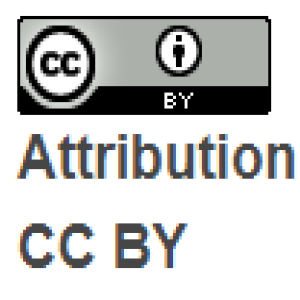
Wednesday Mar 27, 2019
What does ‘copyright’ mean when I want to publish my article?
Wednesday Mar 27, 2019
Wednesday Mar 27, 2019
Hi this is Lou Peck and I’m going to talk to you about copyright in under 60 seconds.
As the author you are the first copyright owner of your work unless commissioned by your institution or funder.
For subscription journals you sign a publisher copyright transfer agreement (CTA) for all versions of that work. You MIGHT have additional rights like reusing parts of the article; distributing a limited free copy; and/or self-archiving in a repository.
For open access (OA) journals you, the institution or funder pay the publisher an Article Processing Charge (APC) and sign an open licence like Creative Commons – e.g. Attribution Only or CC BY. The publisher still edits, prints and distributes the article for commercial means but you retain the other rights.
For hybrid journals you will EITHER sign a CTA or pay the APC and sign an open licence.
Before submitting, check what is available to ensure you understand your rights.
Discover more at internationalbunch.com/resources
Image sourced from - https://creativecommons.org/licenses/

Wednesday Mar 06, 2019
What is Library Publishing and how is it different from a University Press?
Wednesday Mar 06, 2019
Wednesday Mar 06, 2019
What is Library Publishing and how is it different from a University Press?
Hi this is Lou Peck from the International Bunch and I’m going to talk to you about library publishing in under 60 seconds.
Library publishing (also known as campus-based publishing) is where an academic library provides publishing services like electronic open access content.
Library publishing services can complement a university press and though both at the same institution may have different objectives, but they are mostly aligned under the institutions vision.
A library publishing service could concentrate on pioneering publishing innovatives e.g. open source publishing platform DPubS (Cornell University) and the press publishes books and journals, or the press could publish open access books and the library publishes peer-reviewed journals (University of Pittsburgh).
Check out SPARC and the Library Publishing Coalition for more in-depth information.
Discover more helpful resources at internationalbunch.com/resources
Image taken from - https://www.hastac.org/news/library-publishing-coalition

Monday Mar 04, 2019
What is the problem with predatory publishers?
Monday Mar 04, 2019
Monday Mar 04, 2019
What is the problem with predatory publishers?
Hi, this is Claire Sewell from the Office of Scholarly Communication in Cambridge and I’m going to talk about the problem of predatory publishers. These are publishers which take advantage of a lack of knowledge about how Open Access works in order to dupe researchers into publishing with them. They do this by charging a fee to make work available but without providing the services this would normally cover like copyediting and peer review. This results in substandard work being published as legitimate research.
These publishers often solicit content directly from researchers which can be very flattering. Authors should always check potential publishers carefully to ensure that they provide the services they claim to and offer high quality research. Problems to watch out for include overly flattering emails offering to publish, peer review times which seem too good to be true and a poor quality website. If in doubt, researchers should use a website like Think. Check. Submit to help them assess the title.
To find out more, go to internationalbunch.com/resources

Thursday Feb 28, 2019
#Donein60Seconds
Thursday Feb 28, 2019
Thursday Feb 28, 2019
Have you heard about our #Donein60Seconds challenge?
Explore the full transcript and links: https://www.internationalbunch.com/post/donein60seconds

Thursday Feb 28, 2019
What are Altmetrics?
Thursday Feb 28, 2019
Thursday Feb 28, 2019
Learn more about altmetrics from Andy Tattersall, Information Specialist at The University of Sheffield.
Hi, this is Andy Tattersall from The School of Health and Related Research at The University of Sheffield and I’m going to talk about Altmetrics in under 60 seconds.
Altmetrics first appeared in 2010 and are in essence alternative indicators of scholarly interest. They provide additional information in addition to traditional metrics such as citations and impact factor scores. They can measure traditional and social media attention, Wikipedia and policy document citations, downloads, views and how many times an article has been saved to a reference management tool such as Mendeley.
Not only can they measure traditional outputs such as journal articles but other artefacts such as datasets, posters and figures, anything that has a trackable ID such as a Pubmed ID, ISBN or DOI. There are several platforms out there that track or make sense of such attention so its worth looking at Altmetric.com, Growkudos, ImpactStory, Figshare, Dimensions and Plum Analytics.
To find out more, go to internationalbunch.com/resources
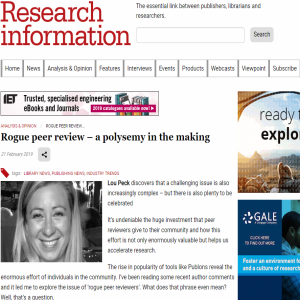
Friday Feb 22, 2019
Rogue Peer Review - a polysemy in the making
Friday Feb 22, 2019
Friday Feb 22, 2019
Hear Founder Lou Peck cover her editorial 'Rogue Peer Review - a polysemy in the making' in Research Information - if you would like to read the piece in full, simply log in or register for Research Information where you will find lots of other interesting editorial pieces - http://bit.ly/2SRG8Dp

Wednesday Feb 13, 2019
What is the new Wiley agreement with Projekt DEAL?
Wednesday Feb 13, 2019
Wednesday Feb 13, 2019
Hi this is Lou Peck from the International Bunch and I’m going to talk to you about Projekt DEAL in under 60 seconds.
Projekt DEAL represents nearly 700 academic institutions in Germany and announced in January 2019 a countrywide partnership with Wiley. This three year agreement gives Projekt DEAL access to Wiley’s academic content back to 1997 for an annual fee – and Projekt DEAL can publish articles open access in Wiley’s journals.
It encompasses three new initiatives:
- A new flagship OA interdisciplinary journal
- An open science and author services development group focused on innovating and accelerating new publishing approaches
- An annual symposium for early career German researchers focused on cutting-edge ideas on the future of research communications
This is the first major transformative deal of its kind.
To find out more, go to internationalbunch.com/resources

Tuesday Feb 12, 2019
Tuesday Feb 12, 2019
Discover Founder Lou Peck talk about her experience of the recent RLUK and Arcadia Fund event and a summary of the discussions.

Tuesday Feb 12, 2019
What is a University Press?
Tuesday Feb 12, 2019
Tuesday Feb 12, 2019
Learn more about what a University Press is in under 60 seconds from Lou Peck, The International Bunch Founder:
Hi this is Lou Peck from the International Bunch and I’m going to describe a University Press in under 60 seconds.
So what is a university press? Well it’s an extension to an academic institution that simply publishes content. They are different to commercial publisher as they are not-for-profit and often subsidized by their institution to compensate the shortfall. They’ll publish scholarly content like books and journals and target a smaller audience with a regional or subject focus and most offer open access content. They support publishing efforts of their own institution’s researchers or the wider researcher community. They are aligned to the institution’s mission and objectives as well as work closely with or even in the university library.
To find out more, go to internationalbunch.com/resources
